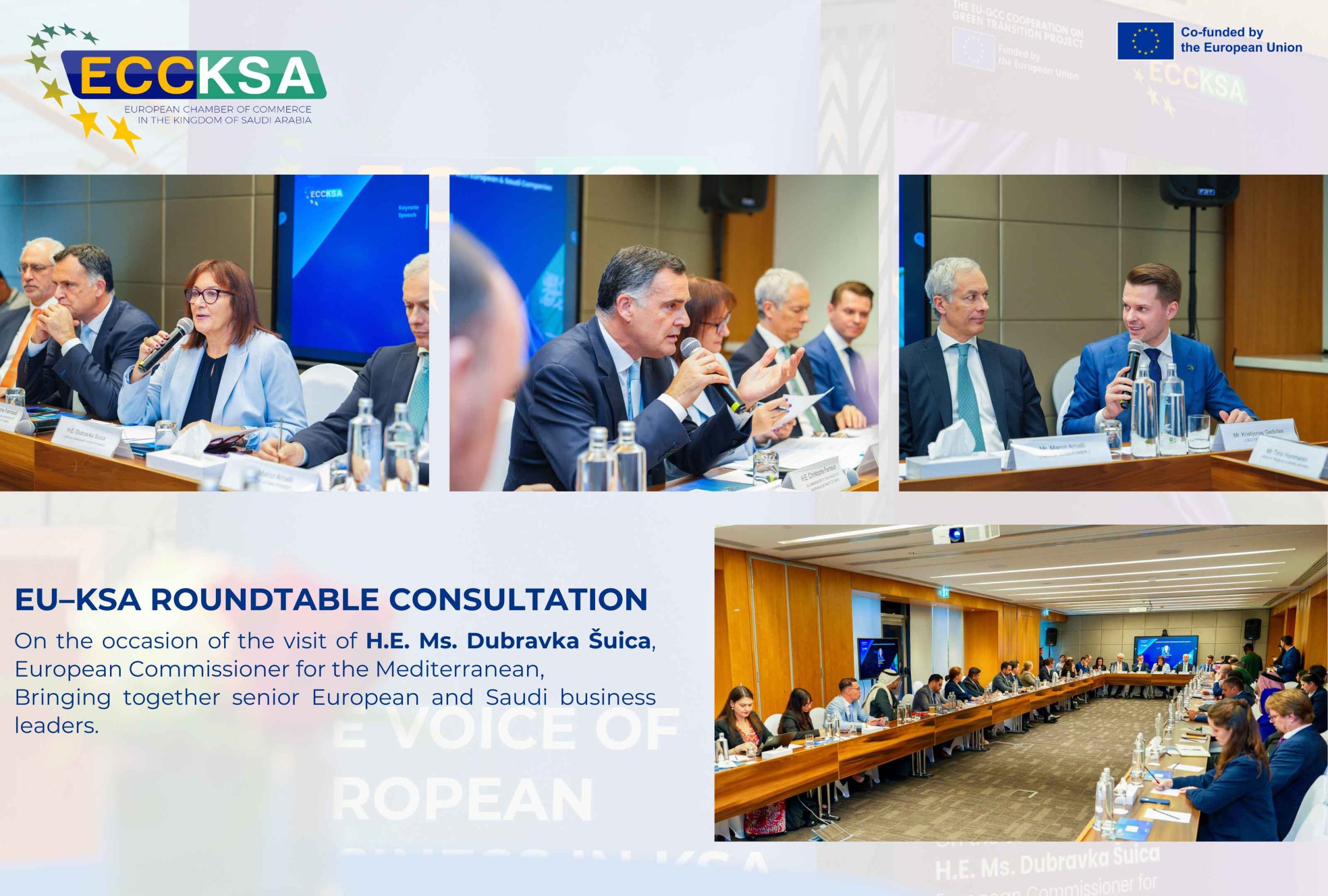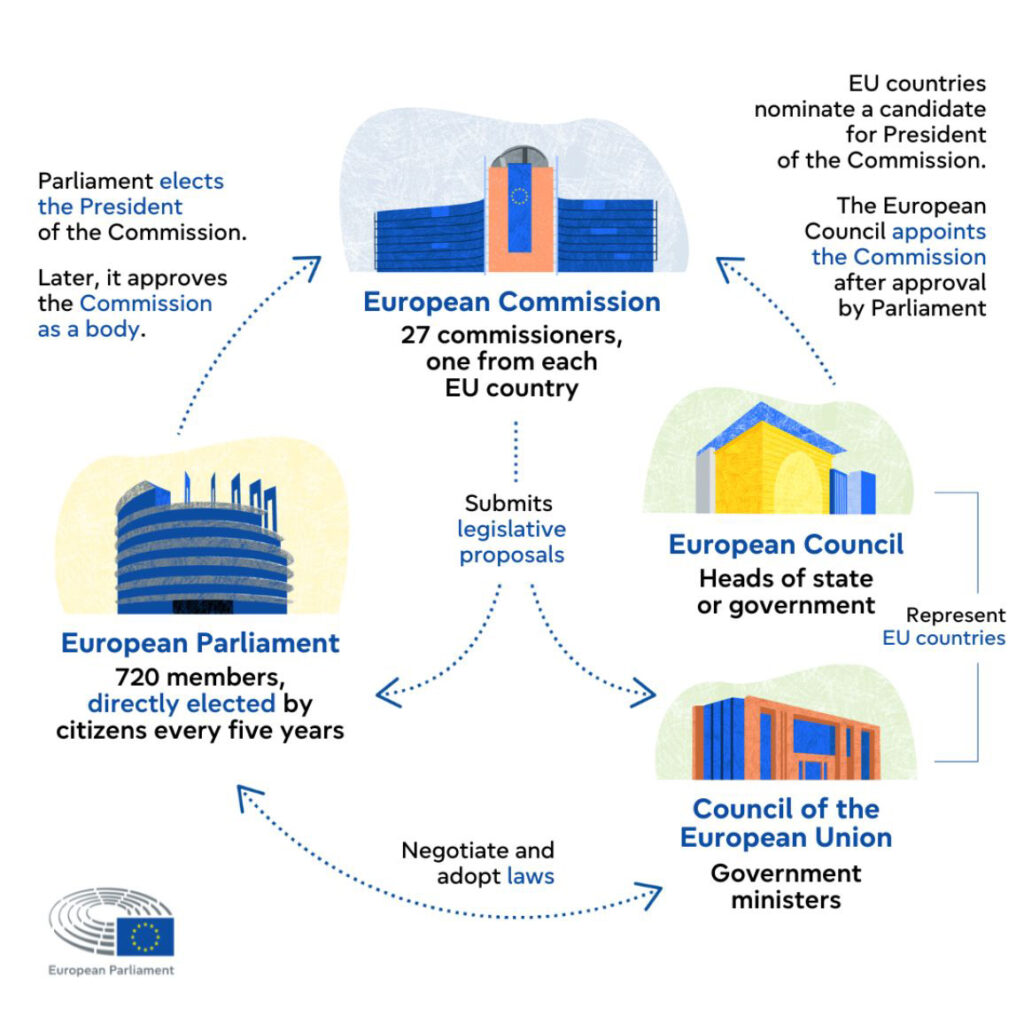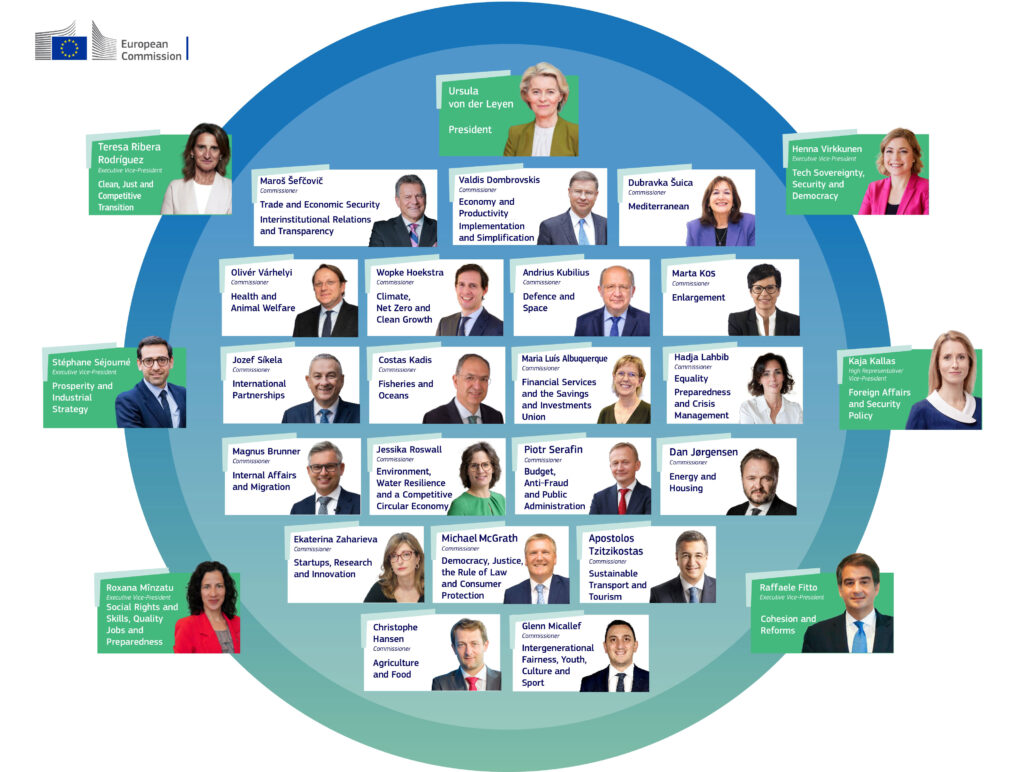
Home » Understanding the European Union: Institutions, Roles, and External Engagement
May is a symbolic month for the European Union (EU), as every year on the 9th of May, the EU celebrates Europe Day. This marks the anniversary of the 1950 Schuman Declaration, a founding moment in the EU’s history. This declaration, delivered by the French Foreign Minister Robert Schuman, proposed pooling coal and steel production between European countries, an idea that led to the creation of the first European Community, and considered as the beginning of what is now the European Union. In 2025, Europe Day marks the 75th anniversary of the Schuman Declaration.
This is an opportunity to consider the European Union’s history, its core principles of peace, collaboration, and cohesion, and to enhance understanding of its operational mechanisms. In European cities, institutions open their doors to citizens for the occasion, and across the world, EU Delegations, the diplomatic representations of the European Union abroad (European External Action Service), organise public events, discussions, and cultural programmes to mark the occasion. As part of global celebrations, a dedicated Europe Day programme has been prepared for Expo 2025 in Osaka, Japan.
In this context, and particularly here in Saudi Arabia in the context of the recent visit of the EU Commission’s Director-General for Energy to Riyadh, it is timely to provide an explanation of how the European Union works, especially for leaders, institutions, and companies engaging with Europe in areas such as trade, energy transition, digital transformation, and innovation. The EU is often seen as a single bloc, but it is also a political system made up of different institutions with distinct and interdependent roles. For businesses and partners wishing to cooperate with Europe, understanding this structure, including the role of European Commissioners, Directorates-General, and other institutions, is important.
This article aims to offer an overview of the development of EU institutions, the executive and administrative machinery of the European Commission, and how the EU engages internationally. It aims to clarify the institutional logic of the EU, while supporting stronger cooperation between European and Saudi partners.
The European Union (EU) was born out of a desire for lasting peace and shared prosperity among European nations after the Second World War. As a result of the Schuman Declaration, six European countries consisting of Belgium, Federal Germany, France, Italy, Luxembourg, and Netherlands founded the European Coal and Steel Community (ECSC) in 1951 under the Treaty of Paris. This community was based on a triangular institutional model: a High Authority representing the general interest (the executive body), a Common Assembly representing the citizens of Europe, and a Special Council of Ministers representing each Member States. A Court of Justice was also created to ensure the observance and uniform application of the Treaty.
This structure was further developed in 1957 by the six member states with the adoption of the Treaties of Rome, which established the European Economic Community (EEC), and the European Atomic Energy Community (Euratom). The EEC aimed to create a common market with free movement of workers, goods, services and capital among member states. The High Authority was replaced by the European Commission, empowered to propose and implement policy measures. The Council of Ministers continued to play a central decision-making role, acting on proposals from the Commission, while the Consultative Assembly evolved into a more active parliamentary body.
In 1962, the Consultative Assembly officially became the European Parliament, which gained increasing powers over time, notably with the introduction of direct universal suffrage in 1979. The Council of the EU represents the member states’ government. Today, the Parliament shares legislative and budgetary powers equally with the Council of the EU in most policy areas, acting as co-legislators on proposals from the European Commission. In 2025, the European Union is composed of 27 Member States.
Other institutions were established over the years:
This distinctive political structure transcends traditional governance. The executive function is primarily held by the European Commission. The Commission proposes laws, manages the budget, and implements EU policies, acting in the European interest rather than national interests.
The legislative process involves two “chambers”:
This dual legitimacy ensures that both citizens and national governments are involved in shaping EU law.

The European Commission is at the core of the EU’s executive power. It acts independently from national governments and is responsible for proposing legislation, enforcing EU law, managing programmes, and representing the EU externally in specific domains.
Under the leadership of its President, the European Commission is guided by a College consisting of 27 Commissioners, with one representative from each Member State. Each Commissioner is assigned a specific policy portfolio, such as Energy and Housing; Startups, Research and Innovation; Trade and Economic Security; or Climate, Net Wero and Clean Growth, much like a minister in a national government. Commissioners of the European Union, nominated by their respective member states, are required to act in the interests of the Union as a whole, independently of their national affiliations and without serving as official representatives of their originating countries. The European Parliament approves the five-year term of the College of Commissioners, which operates as a collective body making joint decisions. This structure ensures political guidance and democratic legitimacy in the Commission’s work, with Commissioners playing a central role in shaping and implementing EU policy across a wide range of sectors.
The European Council nominates the President of the Commission, who is then elected by the European Parliament. In July 2019, the European Council nominated H.E. Ursula von der Leyen, and she was elected as 13th president of the European Commission by the European Parliament. Several Vice-Presidents support the President in coordinating horizontal priorities, such as the green or digital transitions.

The European Commission is organised into policy departments known as Directorates-General (DGs), which operate in a way similar to national ministries. Each DG is responsible for a specific policy area and is headed by a Director-General, who oversees the technical, legislative, and administrative work within their domain. In total, over 30 DGs develop, implement, and manage EU policies, legislation, and funding programmes.
DGs are responsible for:
Based in Europe, EU Special Representatives (EUSRs) are appointed to represent and advance the European Union’s interests and policies in specific regions and countries. They provide the EU with an active political presence in key countries and regions, acting as a “voice” and “face” for the EU and its policies. At present, ten EUSRs support the work of the High Representative of the Union for Foreign Affairs and Security Policy, H.E. Kaja Kallas.
In the Gulf region, H.E. Luigi Di Maio was appointed as the first EU Special Representative on 15 May 2023. His role is to help deepen and strengthen the EU’s strategic and comprehensive partnership with the Gulf countries.
Abroad, the European Union has established a unified diplomatic body known as the European External Action Service (EEAS). Through the EEAS, the EU is represented on the ground by its Delegations, which speak on behalf of the entire European Union, not just the European Commission. Each Delegation is headed by an EU Ambassador, who is formally recognised as the European Union’s official representative. There are more than 140 such Delegations operating worldwide.

The EU Delegation to the Kingdom of Saudi Arabia, the Kingdom of Bahrain, and the Sultanate of Oman is currently led by Ambassador H.E. Christophe Farnaud. Based in Riyadh, this Delegation was inaugurated in 2004 and represents the EU not only to these three Gulf countries but also to the Secretariat of the Gulf Cooperation Council (GCC).Additional EU Delegations were later opened in the UAE (2013), Kuwait (2019), and Qatar (2022).
The Delegation is responsible for managing a wide-ranging political and economic dialogue between the EU and the Gulf region, both on a bilateral and regional basis. One of its core roles is to promote closer economic integration between the EU and the Gulf countries, with a strong focus on trade.
With the backing of this diplomatic presence, the relations between the European Union and the Kingdom of Saudi Arabia have deepened significantly in recent years. Since 2021, the EU and Saudi Arabia have formalised political dialogues under a cooperation arrangement that is providing a framework for cooperation on both the political and technical level. In 2023, bilateral trade between the EU and Saudi Arabia surpassed €70 billion. The European Union is the second trading partner for Saudi Arabia, and the leading source of foreign direct investment (FDI) in the Kingdom, accounting for 66% of total FDI inflows and 39% of total FDI stock in 2022. In key sectors such as trade, energy transition, digital economy, infrastructure, and research and innovation, the EU holds both regulatory and financial competences that play a central role in shaping international partnerships.
In this context, visits by European Commissioners and Directors-General to strategic partners such as Saudi Arabia are moments of high-level engagement that reflect mutual interest in dialogue and cooperation. These visits serve several purposes:
Such visits are organised in close coordination with EU Delegations on the ground and often include meetings with local ministries, business communities, regulators, and civil society actors.
For Saudi institutions and companies, as well as for European companies operating in the Kingdom, these engagements provide valuable opportunities to better understand EU frameworks, contribute to the conclusion of international partnerships and implement them.
It was in this context that, on 29 April 2025, the European Chamber of Commerce in the Kingdom of Saudi Arabia (ECCKSA), in close cooperation with the Delegation of the European Union to Saudi Arabia, had the honour of contributing to the visit of Ms Ditte Juul-Jørgensen, Director-General of the European Commission’s Directorate-General for Energy (DG ENER), to Riyadh. As part of her official programme with Saudi authorities, Ms Juul-Jørgensen took part in a focused roundtable with leading European energy companies operating in the Kingdom, where she shared valuable insights into the local energy landscape. Read more here
The European Union has developed over decades into a sophisticated political and institutional system with a unique structure. Its institutions act collectively to shape, adopt, and implement policy across a wide range of sectors that have relevance beyond the Union’s borders.
As the EU strengthens its strategic engagement with international partners, including Saudi Arabia, a better understanding of its institutional architecture, particularly the role of the European Commission, its Commissioners, and Directorates-General, can support deeper and more effective cooperation between public and private actors. The European Chamber of Commerce in the Kingdom of Saudi Arabia (ECCKSA) actively supports the trade dialogue and fosters mutual understanding between European and Saudi stakeholders, placing particular emphasis on strengthening private sector engagement and promoting business cooperation.
Membership
Committees
Events
News & Media
Publications
Other
About Us
Membership
Committees
Events
News & Media
Publications
Other